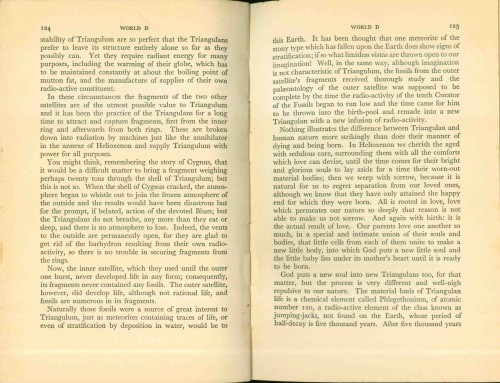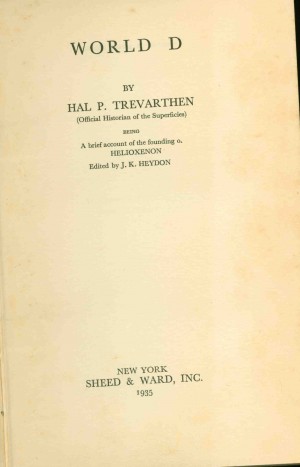Science
Science papers with double meanings
Jacks of Science has collected a list of "Unintentionally inappropriate science papers" which includes:- AN Oraevsky, Spontaneous emission in a cavity, PHYS-USP, 37 (4), 393-405 (1994)
- D. Vlassopoulos, et al. From hairy balls to hairy rods : Using macromolecular chemistry to bridge the gap between polymers and colloids, The Journal of Rheology (2000)
- S. Tanveer, Surprises in Viscous Fingering, J. Fluid Mech. vol. 409, pp. 273–308 (2000)
- W. Likos, N. Lu. Automated Measurement of Total Suction Characteristics in High-Suction Range: Application to Assessment of Swelling Potential, Journal of the Transportation Research Board, Vol. 1755 119-128 (2001)
Pinto, RMN. (1962). Sex and acoustic trauma: audiologic study among 199 Varig Airlines (Brazil) Flight-Stewards and Stewardesses. Revista Brasileira de medicina. 19(6): 326-327.
Unfortunately not as interesting as it sounds, because by "sex" they mean "gender". And also:
Carbaugh, BT, et al. Effects of morphological variations of chicken models on sexual responses of cocks. Animal Behaviour. 10: 235-238.
Posted By: Alex - Tue Oct 14, 2008 -
Comments (3)
Category: Science, Sexuality
A Sleeping Dog
In 1965 the French neurophysiologist Michel Jouvet operated on 35 cats, creating lesions in a part of their brainstem called the locus coeruleus. The operation caused no visible difference in their waking behavior, but their behavior while sleeping changed dramatically. They would stalk, leap, and pounce on imaginary prey -- while completely asleep. Jouvet concluded that the locus coeruleus is responsible for suppressing muscle activity during sleep. Damage it, and you act out your dreams.That's the scientific explanation of the phenomenon, which is a long way of introducing this video of a dog "running" while asleep. Evidently the dog doesn't have a fully functioning locus coeruleus.
Posted By: Alex - Sun Oct 05, 2008 -
Comments (3)
Category: Animals, Science
Weird Horses
Posted By: Paul - Thu Oct 02, 2008 -
Comments (1)
Category: Animals, Photography and Photographers, Science, Books
Anger and Landscape Art
 Do you feel angry and frustrated sitting in your windowless cubicle grinding away at a dead-end job? Recent research (published in the journal Environment and Behavior) indicates there may be an easy way to brighten your mood, at least if you're a man. Hang a few art posters.
Do you feel angry and frustrated sitting in your windowless cubicle grinding away at a dead-end job? Recent research (published in the journal Environment and Behavior) indicates there may be an easy way to brighten your mood, at least if you're a man. Hang a few art posters.Researchers at Texas A&M University conducted an experiment in a simulated office. Participants were told that the researchers were investigating performance on a variety of computer tasks. In reality, the computer tasks were designed to "provoke stress and anger." The question was whether the artwork hanging on the wall (abstract art, nature posters, abstract and nature posters, or no art) would modify people's moods. The conclusion:
It's not clear why men are calmed by wall art, but not women. Maybe men are just simpler creatures.
Posted By: Alex - Mon Sep 29, 2008 -
Comments (5)
Category: Art, Science, Experiments
Why Study Science?
Has science ever looked duller than in this video?
Posted By: Paul - Fri Sep 19, 2008 -
Comments (4)
Category: Boredom, Education, Family, Children, Parents, Futurism, Pop Culture, Science, Technology, Video, 1950s, Yesterday’s Tomorrows
The Man Shot By a Particle Beam
Given the recent startup of the Large Hadron Collider, it seems timely to remember the tale of Anatoli Bugorski.On July 13, 1978 Bugorski leaned down to check a part in a U-70 synchrotron particle accelerator. He saw a brilliant flash of light. He had just become the first man to be shot through the head by a particle beam. Miraculously, he survived, although the left side of his face was paralyzed. The beam was highly radioactive, but also very focused, and therefore the radiation didn't disperse into his body. More details at Forgetomori.
What would happen if someone were hit by the LHC's particle beam? I doubt they'd fare as well as Bugorski. To put its power in perspective, Scientific American calculated that it could defrost a pizza in 30 nanoseconds (billionths of a second), assuming the beam energy could be spread across the entire surface of the pizza.
Posted By: Alex - Thu Sep 18, 2008 -
Comments (0)
Category: Science
Who’s coming to see the LHC?
The Large Hadron Collider in Geneva may not have caused the end of the world, but some believe it's attracting extraterrestrial visitors. The Louth Leader is on top of this important story:"I was having a cigarette outside my front door on Saturday at around 9pm and I looked over the roof tops and saw two orange-red glowing lights coming from over the hill where I live... We live in a little village in Swansea and after 47 years of looking up at night this is the first UFO I have ever seen."
He added: "Could it be something to do with that experiment they are doing under ground in Geneva letting out pockets of energy or something?"
To be fair to "Anthony from Wales," it's not clear to me whether he's suggesting that the collider is attracting ETs, or if it's releasing visible flashes of energy into the atmosphere. Not that one option would be any more logical than the other.
Posted By: Alex - Wed Sep 17, 2008 -
Comments (0)
Category: Paranormal, Science
Smoke on the Water

I should have known it would be. I had already read this news about how weekends attract bad weather.
WEEKEND WEATHER REALLY IS WORSE
The most comprehensive weather study ever has confirmed what we all suspected - the weather really is worse at weekends.
Meteorologists at the University of Karlsruhe evaluated 6.3 million pieces of climate data from across Europe between 1991 and 2005.
Their conclusion: On weekends the weather is worse than on weekdays.

Q: Why does the smoke from a campfire seem to blow into your face no matter where you sit or how many times you change position around the fire?
A: Your body blocks the flow of fresh air drawn to the flames. You are then creating a low air pressure area with your body and the warm smoke moves toward the lowest air pressure. With no wind, no matter where you sit in relation to the fire, the smoke will be drawn toward you.
Sometimes you just can't win....
Posted By: Paul - Sun Sep 14, 2008 -
Comments (3)
Category: Entertainment, Family, Food, Science, Weather
World D
Here's another strange book I purchased but have not yet read. The real author is Joseph K. Heydon, using the pen-name of Hal Trevarthen. Time has swallowed up all details related to Heydon and his book, leaving us only with the text itself.Here's the description from the amazingly ugly dustjacket.
Here's the title page, followed by a sample of the actual bafflegab inside.
 Posted By: Paul - Thu Sep 11, 2008 -
Comments (11)
Posted By: Paul - Thu Sep 11, 2008 -
Comments (11) Category: Aliens, Eccentrics, Government, Inventions, Literature, Books, Science Fiction, Writers, Nature, New Age, Paranormal, Pop Culture, Science, Psychology, Self-help Schemes, Foreign Customs, 1930s, Yesterday’s Tomorrows
The Mighty Powers of Hagfish Slime
My high-school pal Sherry Mowbray, who grew up to be a top-flight biologist, points me with glee to this video illustrating how powerful is the slime secreted by the awesome hagfish.
Posted By: Paul - Wed Sep 10, 2008 -
Comments (11)
Category: Animals, Science, Experiments, Body Fluids

| Who We Are |
|---|
| Alex Boese Alex is the creator and curator of the Museum of Hoaxes. He's also the author of various weird, non-fiction, science-themed books such as Elephants on Acid and Psychedelic Apes. Paul Di Filippo Paul has been paid to put weird ideas into fictional form for over thirty years, in his career as a noted science fiction writer. He has recently begun blogging on many curious topics with three fellow writers at The Inferior 4+1. Contact Us |







